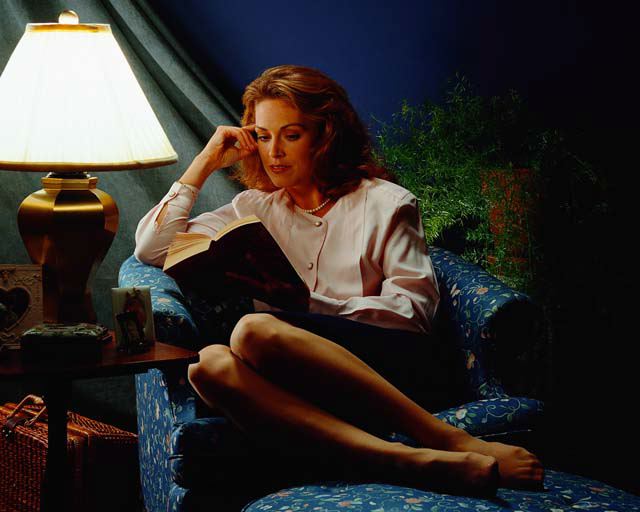Every December 31st I sit down with the list of books I read that year and choose the best ones. I usually end up with 10 bests plus 5 honorable mentions. I include this many because I’m fortunate enough to be in the time of life when I can choose to read whatever I want, so I usually like every book I read. Sometimes whittling the list down is hard work.
Recently I saw a meme in an online book group: What are your top 5 novels of all time?
If choosing 10 or even 15 from a year of reading is hard, how difficult could it be to pick my top five books of all time? I decided to give this challenge a try.
To my surprise, the top four came quite easily. Although I’ve read a lot of books in my time, these four novels have stuck with me because they hit that sweet spot of my encountering them at a time when I needed what they have to offer.
1. To Kill a Mockingbird (1960) by Harper Lee
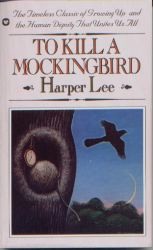 I remember this book being on the reading curriculum in eighth grade. I did the math, and 1960 was the year I finished eighth grade, so my memory may be correct. However, it’s possible that my memory is distorted. I distinctly remember feeling outraged when, three or four years after I was in eighth grade, the mother of a then eighth grader filed a complaint over having her daughter read a book about rape. Maybe I did read it in eighth grade, or maybe it didn’t land on the curriculum until later and I read it on my own.
I remember this book being on the reading curriculum in eighth grade. I did the math, and 1960 was the year I finished eighth grade, so my memory may be correct. However, it’s possible that my memory is distorted. I distinctly remember feeling outraged when, three or four years after I was in eighth grade, the mother of a then eighth grader filed a complaint over having her daughter read a book about rape. Maybe I did read it in eighth grade, or maybe it didn’t land on the curriculum until later and I read it on my own.
Whichever is the case, this is the book that has stuck with me the longest and that I have reread the most often. Whenever I get to feeling down on my fellow man, I reread this book to restore my faith in humanity. (In fact, I’m due for another reread soon.)
Yet, as much as I’d like to think that I love this book for its themes of justice and human compassion, I’m pretty sure the novel stuck with me because my father died in 1960, two months before I turned 12, after a long and painful separation from my mother and me. The portrayal of Atticus Finch, the wise and caring father, probably impressed me just as much as the story of Atticus Finch, the brave lawyer who defended Tom Robinson. If it’s true that we can live vicariously through literature (and I believe it is), then this book probably comforted me through my fatherless adolescence.
2. All the King’s Men (1946) by Robert Penn Warren
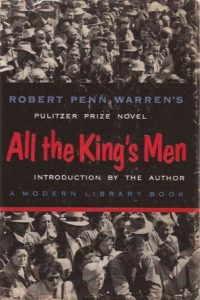 Again, I’m not sure when I first read this remarkable novel. My memory places it in eighth or ninth grade.
Again, I’m not sure when I first read this remarkable novel. My memory places it in eighth or ninth grade.
This is the novel with which I discovered how powerful a fine work of fiction can be. For the first time, all the pieces of the literary criticism puzzle fell into place: the use of the first-person narrator, the metaphor of the narrator’s last name (Burden), the powerful (for both the narrator and the reader) epiphany, the quality of the prose.
I don’t remember why I first read this book. It’s possible that it was on a reading list for school (in which case, I would probably have come across it in ninth grade). I can’t imagine how else I would have found it. Nobody in my household was a reader, and we didn’t have many books around. But no matter how I came upon it, I always think of this novel as my initiation into adult reading. I have reread it a couple of times in my adulthood, and it holds up very well.
3. Disturbances in the Field (1983) by Lynne Sharon Schwartz
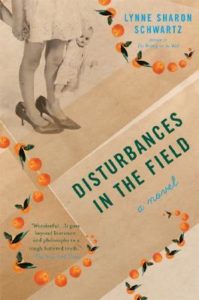 This story features a group of people who have known each other since their college days, when they used to get together and discuss philosophical ideas. In the book’s present time, these people are entering middle age.
This story features a group of people who have known each other since their college days, when they used to get together and discuss philosophical ideas. In the book’s present time, these people are entering middle age.
I read this book when I was about the age of those characters and was beginning to realize that life is much more complicated than school prepares us for. In late adolescence and early adulthood, when we are beginning to be able to reason abstractly, we tend to think in dichotomies: it’s right to do this and wrong to do that, you either believe what I believe or you’re on the other side.
But life is very seldom so simple. Approaching middle age, I had had enough life experience to realize that what sounds convincing in theory often isn’t directly applicable in reality, that actual situations are usually not black or white but one of many—way more than 50—shades of gray between the two extremes. Like the characters in this novel, I had to learn by experience how to navigate life’s big events such as love, marriage, parenthood, death, and grief.
4. A Little Life (2015) by Hanya Yanagihara
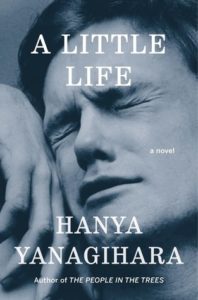 This recent novel is a lot like To Kill a Mockingbird in the sense that it’s one of the most moving, poignant books I’ve ever read.
This recent novel is a lot like To Kill a Mockingbird in the sense that it’s one of the most moving, poignant books I’ve ever read.
This big novel covers the lives of four men who met as college roommates. The story opens just after they have graduated from college in Massachusetts and have all moved to New York City to undertake their careers as an actor, a lawyer, an architect, and an artist. In 814 pages, the book unfolds their intertwined lives in magnificent detail.
The story of how four people come together to form a surrogate family moved me because, like all four of them, I grew up in a dysfunctional, non-nurturing household and went off to college to start a new life.. One of the four characters, who becomes the focal point of the book, suffered a horrific childhood that he’s unwilling to talk about. The other three all intuit that he needs their protection and support, and the novel probes both the high and low points of their shifting constellation of interpersonal relationships. As someone who has been fortunate enough to meet a crucial person whom I needed at each significant point in my life, I found this novel both poignant and ultimately uplifting.
Although these four books came easily, number five was a tough decision. Only one more spot on the list remained, yet several books came to mind:
- Plainsong by Kent Haruf
- The Blind Assassin by Margaret Atwood
- Lillian Boxfish Takes a Walk by Kathleen Rooney
- The Help by Kathryn Stockett
- Our Souls at Night by Kent Haruf
When I looked at the first four, I realized that they give a chronology of my life, from childhood to early adulthood to middle age and then to older age. This suggested that the last spot on the list should also go to a book about my current point on life’s continuum, older adulthood. The Blind Assassin, Lillian Boxfish Takes a Walk, and Our Souls at Night all fit that category. On the other hand, Plainsong is about the most effectively written novel I’ve read.
But after a lot of dithering I have decided to go with the following choice:
5. The Help (2009) by Kathryn Stockett
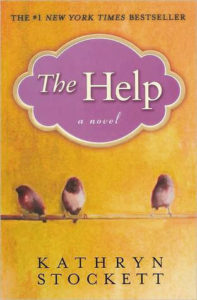 When I was 57, I felt driven to go back to school because of a nagging feeling that there was more I needed to learn through formal schooling, not just life experience. I started a doctoral program in psychology during which several pieces fell together seemingly by magic. I wrote my dissertation on life stories and received my doctorate on my 63rd birthday.
When I was 57, I felt driven to go back to school because of a nagging feeling that there was more I needed to learn through formal schooling, not just life experience. I started a doctoral program in psychology during which several pieces fell together seemingly by magic. I wrote my dissertation on life stories and received my doctorate on my 63rd birthday.
One of those pieces that fell magically into place was this novel. Set in 1962, it’s the story of a young, white southern woman who dares to write down the life stories of the African American women who work as maids in her community. This book strongly asserts the belief that everyone has a life story and that everyone’s life story deserves to be heard.
In my late-life doctoral study I realized that it’s especially important for us to seek out and learn from the life stories of marginalized people and of people different from ourselves if society is to evolve and persevere. For that reason, this novel won the final spot on my list of the Top 5 Novels of All Time.
How about you?
What titles are on your list of the Top 5 Novels of All Time?
© 2017 by Mary Daniels Brown

